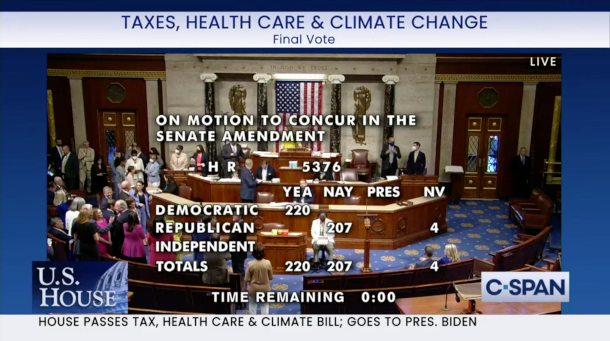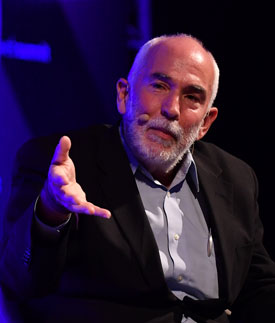Democrats Deliver on Climate
Air Date: Week of August 12, 2022

The U.S. House of Representatives passed the Inflation Reduction Act of 2022 on August 12. All Democratic representatives voted yes to pass, while no Republican representatives did. (Screenshot: C-SPAN)
The United States Congress has passed historic climate legislation with the enactment of the 2022 budget reconciliation measure called the Inflation Reduction Act. This first serious federal legislation to address the climate crisis includes about $400 billion to address climate and clean energy over the next decade, as well as major tax reforms and mandated consumer cost cuts for health care. With help from Aaron Bernstein MD of Harvard and Car Talk blogger Jim Motavalli, Hosts Steve Curwood and Jenni Doering analyze the new law, including details about expanded electric vehicle incentives.
Transcript
CURWOOD: From PRX and the Jennifer and Ted Stanley Studios at the University of Massachusetts Boston, this is Living on Earth. I’m Steve Curwood.
DOERING: And I’m Jenni Doering. Well Steve, more than 30 years after you first learned about global warming and started this show, Congress has finally passed serious legislation to reduce emissions.
CURWOOD: Yeah, it’s been a long wait to celebrate if you care about the climate. When Bill Clinton and Al Gore came into office in 1993, they couldn’t get a BTU tax through Congress. And then in 1997 the Senate made it clear it wouldn’t ratify the Kyoto Protocol.
DOERING: Yeah, and in 2009 the Senate filibuster killed the Waxman-Markey cap and trade bill that had passed the House. And then President Obama’s efforts with the clean power plan rules first got repealed by President Trump and then recently scuppered when the Supreme Court set almost impossible hurdles for such regulations.
CURWOOD: But now we have the Inflation Reduction Act, a clever marketing title I must say, and it’s a budget reconciliation measure that restructures some taxes, reduces some health costs, and puts close to 400 billion dollars towards climate action over the next decade. It’s a big deal, and it’s forecast to reduce US emissions by 40 percent over 2005 levels by the end of the decade, close to the target of 50 percent President Biden announced on his first Earth Day in office, so while there is more work to be done now that work will seriously begin.

The Inflation Reduction Act includes funding opportunities for schools to operate electric buses and improve air quality in buildings. (Photo: Province of British Columbia, Flickr, CC BY-NC-ND 2.0)
DOERING: Yeah and Steve, how much will this new law actually reduce inflation?
CURWOOD: Interesting you should ask. Former Treasury secretary Lawrence Summers of Harvard says the Act’s provisions that reduce deficits by taxing more of the rich and cut health and energy expenses are in fact all anti-inflationary. Now Larry Summers declined to confirm he had discussed the bill with deficit hawk Joe Manchin, the Democratic Senator from West Virginia, saying in published reports their talks over the past year were private. But Joe Manchin’s holdout for deficit reductions apparently worked and calling the new law the Inflation Reduction Act is not just marketing hype.
DOERING: Oh Interesting. So Steve, let’s take a look now at some of the green details of this measure. There are tax credits for clean manufacturing and renewable energy, including a decade of certainty for tax credits for residential solar. There’s a green bank to attract private dollars for clean technologies and stiff penalties for methane leaks from wells and pipelines. We won’t list all the details now, but you can find more on the Living on Earth website at loe dot org. And although there’s a whole separate section of the Inflation Reduction Act for healthcare, you could say the climate measures themselves are key for health too. So we called up Ari Bernstein, a pediatrician and Interim Director of the Center for Climate, Health, and the Global Environment at the Harvard T.H. Chan School of Public Health to get his take.
BERNSTEIN: I've been working on climate and health for over 20 years. This is by far and away the most important piece of legislation to address the health effects of fossil fuel use and climate change, by a longshot. It doesn't mean that we can now step back and say, we've got this. There's a lot of work to make sure that this legislation gets used in ways that really do promote health and equity and result in the kinds of emissions reductions that we need.

Aaron Bernstein MD is the Interim Director of the Center for Climate, Health, and the Global Environment at the Harvard T.H. Chan School of Public Health, a pediatrician at Boston Children's Hospital, and an Assistant Professor of Pediatrics at Harvard Medical School. (Photo: Courtesy of Harvard T H Chan School for Public Health)
CURWOOD: And the climate crisis is certainly bad news for our health, I mean just recently we’ve seen so much death and illness from extreme heat, fires, storms, and floods. And Dr. Bernstein’s group has shown that air pollution from burning fossil fuels leads to some 300,000 excess deaths every year in this country.
BERNSTEIN: We know from prior work on transportation and on energy systems, that even modest reductions well below what this bill is likely to produce would save, you know, billions and billions of dollars in health costs, avoided deaths. And I think it does depend in some ways on how these funds actually wind up getting used, you can save a lot of carbon without actually reducing air pollution very much. So you know, there's some amount of let's let's wait and see. But, you know, there's certainly a good prospect here of dramatically improving health and particularly addressing health disparities, because so much of the pollution gets emitted in communities that have been historically polluted the most.
DOERING: Now Steve this bill puts around $60 billion towards remedying some of those environmental injustices.
CURWOOD: And Jenni there’s a lot of money for greening transportation, which is a big culprit for the air pollution that hits disadvantaged communities. And overall transportation is the biggest single source of greenhouse gas emissions in the U.S. these days, something like 27%. But if much of the power for electric cars, trucks, and buses keeps coming from coal and gas, it won’t help the climate that much. That’s why a broader shift to clean energy is so important. So now let’s talk about electric cars because that’s easy for folks to relate to.
DOERING: Yeah, sales have been growing but still, only 6 percent of new light vehicles sold last year were electric. After all, EV’s are pricey, about $10k more than gas powered vehicles. So now, the act creates a $35 billion pool for clean fuel and vehicle tax credits, and eligible consumers will save $7500 on any new electric car assembled in America with qualified materials and as much as $4000 for a used one.
CURWOOD: And when do they get that money back, after filing their taxes?

The Inflation Reduction Act boosts fossil fuels, reinstating old oil and gas auctions that the Biden Administration had tried to cancel as well as requiring new future auctions. It also requires the auction of millions of acres of oil and gas leases before the same can be done for wind and solar farms. (Photo: Glenn Euloth, Flickr, CC BY-NC-ND 2.0)
DOERING: Well, that’s how the rebate used to work but now it can be applied at the “point of sale”.
CURWOOD: Oh, so you get to save that money up front?
DOERING: Right. And as Jim Motavalli, CarTalk blogger and green car writer told us, there are some other restrictions on which vehicles qualify.
MOTAVALLI: It puts a cap on the MSRP, or the Manufacturer's Suggested Retail Price on the cars you're buying, you can't use it for really high-end luxury SUVs. And actually, I've recently driven cars like the Mercedes EQS that are well outside this, you know, the purchase price well over $100,000. But for cars, you'll only be able to get vehicles that are $55,000. And below, and for SUVs and trucks 80,000 around in there and below. So, it's not looking to subsidize high end luxury cars for the rich, which is probably a good thing to have in there.
DOERING: Now there’s already a dearth of the computer chips automakers need and the lithium industry forecasts that essential mineral for batteries is going to be in short supply until 2030. But the good news is that in the long term, Jim Motavalli sees a bigger shift towards a more circular supply chain for electric vehicles.

The Inflation Reduction Act provides a tax credit up to $7,500 for buyers of new all-electric cars and hybrid plug-ins as well as creates a separate tax credit worth a maximum $4,000 for used electric. (Photo: City of St. Pete, Flickr, CC BY-ND 2.0)
MOTAVALLI: There's a whole lot of startup companies that are going to be producing particularly lithium in the United States, but also working on recycling some of those materials, so they wouldn't have to be sourced as raw mined materials but could be acquired from existing cars going into junkyards. So that's a big movement now. And I think it's going to be very successful. I think it's, it's something like 95 to 98% of EV minerals and metals can be actually reclaimed from those batteries.
DOERING: Full disclosure, I drive an electric car, and aside from not having to worry about inflated gas prices, they are a lot of fun to drive!
CURWOOD: Yeah! And, this historic legislation has put some pep in the step of those like Dr. Bernstein who are troubled by so much of our current state of affairs.
The Inflation Reduction Act will reduce the deficit by $300 billion.
— President Biden (@POTUS) August 6, 2022
And we’ll do it without raising taxes a penny on those making less than $400,000 a year.
BERNSTEIN: It is a watershed moment that we should all look back on and really be proud particularly at this time when everything seems so fractured, and difficult and headed potentially in the wrong direction. This is an extraordinary step forward.
DOERING: Steve, I was honestly starting to lose hope that any kind of climate legislation could pass through Congress. Just seemed like there was just no way to get around the gridlock in Washington, especially on climate change, given the influence of the fossil fuel industry.
CURWOOD: But recently several key measures have passed, from microchip manufacturing support to medical relief for veterans and to lowered drug prices as part of the momentous climate bill. You know, some fifty years ago, President Joe Biden first went to Capitol Hill, about 35 years ago House Speaker Nancy Pelosi first went there and more than 40 years ago Senate Majority leader Chuck Schumer first came to Congress. And that team called on all that experience and demonstrated the art of compromise in the public interest is not dead.

Jim Motavalli is a freelance environmental journalist and blogger for NPR’s Car Talk (Photo: Seb Daly, Web Summit, Wikimedia Commons, CC BY 2.0)
DOERING: Yeah, the whole Democratic congressional caucus signed onto the measure, from the most moderate to the most progressive, despite criticism from some activists that this bill doesn’t do enough for environmental justice and concedes too much to the fossil fuel industry. That industry has the opposite complaint. The American Petroleum Institute says the measure “falls short in addressing America’s energy needs.”
CURWOOD: Well, Jenni that’s the thing about compromise, nobody gets everything they want. But that’s just what it sometimes takes to get things done. Just a few weeks ago some pundits were sniping at President Biden and his low approval ratings to suggest he should quit after one term. But already after less than two years, with tight margins in the House and a razor thin majority in the Senate President Biden has led the Democrats and the nation to move forward on a broad front, including finally confronting our gravest existential threat. Low polls today perhaps for Joe Biden, but likely high marks in the annals of history.
Links
Read the Inflation Reduction Act
Watch Rep. Kathy Castor and other House Democrats give remarks on the Inflation Reduction Act
Learn more about Pediatrician Aaron Bernstein
Gov Tech | “What Does the Inflation Reduction Act Mean for K-12 Schools?”
Check out Living on Earth’s Interview with Aaron Bernstein on how fossil fuels affect human health
Nerd Wallet | “What the Inflation Reduction Act Means for Green Energy and EV Stocks”
Living on Earth wants to hear from you!
Living on Earth
62 Calef Highway, Suite 212
Lee, NH 03861
Telephone: 617-287-4121
E-mail: comments@loe.org
Newsletter [Click here]
Donate to Living on Earth!
Living on Earth is an independent media program and relies entirely on contributions from listeners and institutions supporting public service. Please donate now to preserve an independent environmental voice.
NewsletterLiving on Earth offers a weekly delivery of the show's rundown to your mailbox. Sign up for our newsletter today!
 Sailors For The Sea: Be the change you want to sea.
Sailors For The Sea: Be the change you want to sea.
 The Grantham Foundation for the Protection of the Environment: Committed to protecting and improving the health of the global environment.
The Grantham Foundation for the Protection of the Environment: Committed to protecting and improving the health of the global environment.
 Contribute to Living on Earth and receive, as our gift to you, an archival print of one of Mark Seth Lender's extraordinary wildlife photographs. Follow the link to see Mark's current collection of photographs.
Contribute to Living on Earth and receive, as our gift to you, an archival print of one of Mark Seth Lender's extraordinary wildlife photographs. Follow the link to see Mark's current collection of photographs.
 Buy a signed copy of Mark Seth Lender's book Smeagull the Seagull & support Living on Earth
Buy a signed copy of Mark Seth Lender's book Smeagull the Seagull & support Living on Earth

